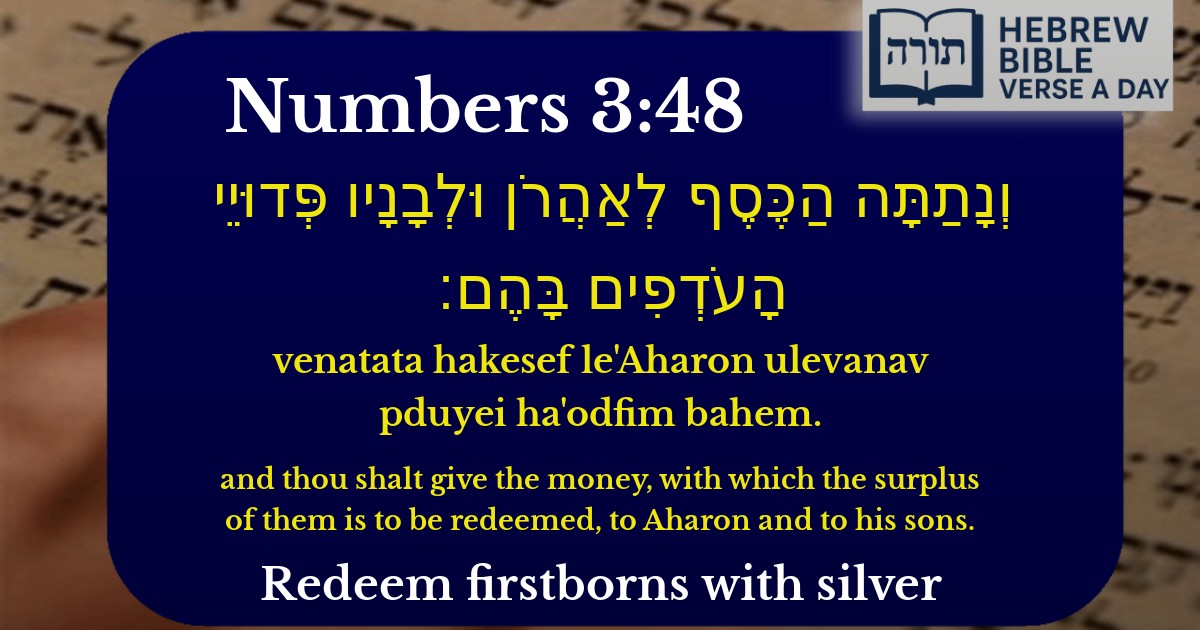Frequently Asked Questions
Q: What does Numbers 3:48 mean?
A: Numbers 3:48 refers to the redemption money given to the Kohanim (priests, Aharon and his sons) for the firstborn Israelites who exceeded the number of Levites. Since the Levites were designated to serve in place of the firstborns, the extra firstborns had to be redeemed with money (five shekels each), which was given to the Kohanim.
Q: Why was the money given to Aharon and his sons?
A: The money was given to Aharon and his sons (the Kohanim) because they were the ones serving in the Mishkan (Tabernacle) and later the Beit HaMikdash (Temple). The Torah designates that certain gifts, including redemption money, belong to the Kohanim as part of their sacred service and livelihood (see Rambam, Hilchot Bikkurim).
Q: What is the significance of redeeming the firstborn?
A: The redemption of the firstborn (Pidyon HaBen) is a mitzvah that reminds us of the Exodus, when Hashem spared the Israelite firstborns during the plague of the firstborn in Egypt. The Levites took their place in service, and the extra firstborns had to be redeemed with money (Rashi on Numbers 3:45). This mitzvah is still observed today for firstborn male children.
Q: How does this verse apply today?
A: Today, the mitzvah of Pidyon HaBen (redemption of the firstborn son) is performed when a firstborn male child is 30 days old. The father gives five silver coins (equivalent to the biblical shekel) to a Kohen, fulfilling the commandment based on this verse (Shulchan Aruch, Yoreh De'ah 305). This connects us to the original redemption in the desert.
Q: Why was the amount five shekels?
A: The Torah specifies five shekels as the redemption price based on the valuation given in the Torah (Numbers 18:16). Rashi explains that this amount was set by Hashem as a fixed value for the Pidyon HaBen. The Talmud (Bechorot 50a) also discusses the significance of this amount in the context of other Torah valuations.


Context in the Torah
The verse (Bamidbar 3:48) appears in the context of the redemption of the firstborn Israelites, where the Levites were taken in their stead for service in the Mishkan. Since there were more firstborn Israelites than Levites, the surplus firstborn had to be redeemed with money, which was given to Aharon and his sons, the Kohanim.
Rashi's Explanation
Rashi explains that the "surplus" refers to the 273 firstborn Israelites who exceeded the number of Levites. The redemption money—five shekalim per person—was given to the Kohanim (Aharon and his sons) as commanded. Rashi emphasizes that this underscores the Kohanim's role in facilitating atonement and sanctity, as they were the ones entrusted with handling sacred matters.
Rambam's Perspective
In Hilchot Bikkurim (11:5), Rambam discusses the laws of redeeming the firstborn, noting that the funds were given specifically to the Kohanim as a form of matnot kehunah (priestly gifts). This highlights the principle that the Kohanim, as servants of Hashem, are sustained by the sacred contributions of the people.
Midrashic Insight
The Midrash Tanchuma (Bamidbar 6) connects this mitzvah to the broader theme of pidyon haben (redemption of the firstborn), teaching that the money symbolizes the transfer of sanctity from the firstborn to the Kohanim, who now serve in their place. This reinforces the idea that the Kohanim are the designated spiritual leaders of Israel.
Halachic Implications